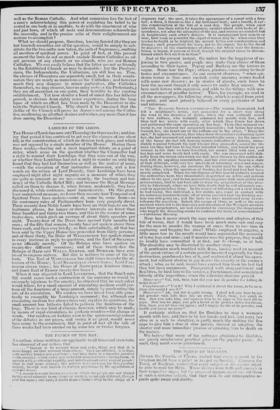LABOURS OF THE LORDS.
THE House of Lords has now sat (Thursday) forthree weeks ; and dur- ing that period it has contrived to get over the clauses of one short bill, in the consideration of which no division took place, and which was not opposed by a single member of the House. During these three weeks,—leaving out a most important debate on a point of order, which arose on the question whether the Chancellor had a right to remind their Lordships that they were out of the way, or whether their Lordships had not a right to wander on until they found that they had lost themselves as well as the matter at issue, —with the exception of that. instructive discussion, and a few words on the return of Lord Dunally, their Lordships have been employed night after night arguing on a measure of which they are quite as ignorant as we are,—namely, the bearings and ten- dency of the Catholic Relief Bill ; and because the Royal Message called on them to discuss it, when known, moderately, they have discussed it, while unknown, most immoderately. On this great, least understood measure, no fewer than seventy-four Temporal and Spiritual Peers have spoken—some at, some to, some from—as the customary rules of Parliamentary logic very properly direct. These seventy-four Noble Lords have been on their legs,to use the legitimate phrase, for longer or shorter intervals no fewer than three hundred and thirty-two times, and this in the course of some twelve days, which gives an average of about thirty speeches per night. Twenty-four Of the Peers have opened their mouths but once ; of the fifty that remain, twenty have not spoken above three times each, and then very briefly ; so that, substantially, all that has been said by the Upper House has proceeded from thirty persons ; and of these thirty, the Duke of WELLINGTON has spoken almost in every instance in reply to questions, and the Earl of SHAFTES- BURY officially merely. Of the Bishops nine have spoken on twenty-five different occasions; and of these twenty-five the Bishops of BATH and WELLS, EXETER, and DURHAM, have con- trived to engross sixteen. But this is nothing to some of the lay. lords. The Earl of WiNcHiLsein has eight times bespoke the at- tention of the House ; Lord REDESDALE eleven times ; Lord FAL- MOUTH eleven times ; his Grace of NEWCASTLE fourteen times ; and JOHN Earl of ELDON twenty-five times When it was objected to Lord LIVERPOOL, that the Small-note Bill would cause such a contraction of the currency as would be extremely injurious to the country, he observed that no such effect would follow, for a small amount of circulating medium could per- form all the functions of a large amount, simply by accelerating the rate of its circulation. We confess we have never been able prac- tically to exemplify his Lordship's argument ; for, although our circulating medium has always been very rapid in its gyrations, the small amount has hitherto failed to perform the functions of the large. There is one kind of change, however, which may be made, by means of rapid circulation, to perform wonders—the change of words. Our readers, on looking even to the quintessential extract of the debates in our pages, and seeing it so great, would never have come to the conclusion, that in point of fact all the talk of three weeks had been carried on by some ten or twelve tongues.


















 Previous page
Previous page